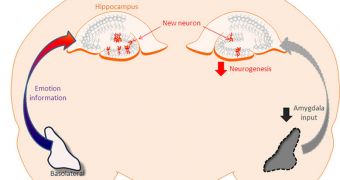Neuroscientists at the University of California in Berkeley (UCB) say they now know the neural pathways that fear uses to burn memories into our brains. The work holds promise for developing methods of allowing people to forget traumatic events and experiences.
The fact that extremely stressful situations sear themselves into our memories is well known, as is the fact that good memories appear to be less capable of doing the same thing. Now, the UCB team sheds some new light on why that happens.
According to the research, whenever we experience fear, the part of the brain in charge with processing this emotion – the amygdala – sends neural signals to the memory hub of the brain – the hippocampus – to produce fresh, new neurons.
All of these new nerve cells are ready for memory imprinting as soon as people pass through yet another ordeal. In a sense, the new cells make people remember things that happened long ago.
The new work was carried out by UCB assistant professor of integrative biology Daniela Kaufer, who is also a member of Wills Neuroscience Institute at the university. The study is published in the June 14 online issue of the esteemed journal Molecular Psychiatry.
“We remember emotional events much more strongly than daily experiences, and for a long time we have known that connections between the amygdala and hippocampus help to encode this emotional information,” the team leader explains.
“Our research shows that amygdala input actually pushes the hippocampus to make new neurons from a unique population of neural stem cells. This provides completely new cells that get activated in response to emotional input,” she goes on to say.
The work has the potential to help many, considering that faulty regulation of emotional memory is one of the leading causes for post traumatic stress disorder (PTSD) and related issues. This poor regulation may also be contributing to anxiety.
“Many affective disorders involve disordered emotional memories like PTSD, depression and anxiety. We think that newborn neurons may play a role in creating these emotional memories,” Kaufer adds.
“The research suggests that newborn neurons play a role not only in the formation of memory, but also in helping to create the emotional context of memory,” adds graduate student and lead study author Elizabeth Kirby.

 14 DAY TRIAL //
14 DAY TRIAL //